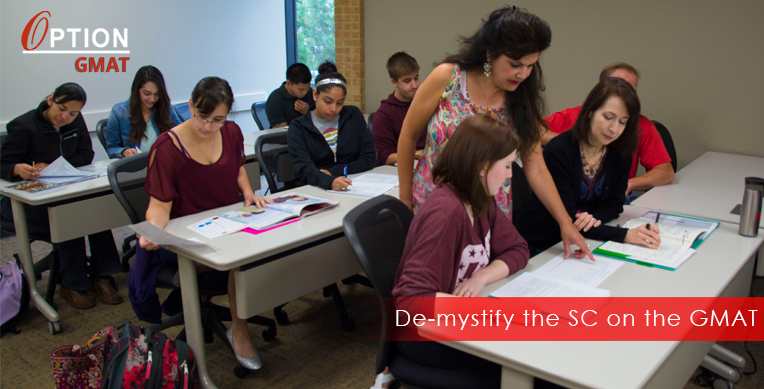- Have any questions?
- +971 509267126
- +971 551207626
- enquiry@optioneducation.ae
Zen and the Art of Grammar: De-mystify the SC on the GMAT

On the Threshold of the New Year….for Applications!
August 19, 2015
Reading Comprehension: the bête noire for most GMAT test takers. Why?
December 8, 2015Zen and the Art of Motorcycle Maintenance (ZAMM) is a great read and a great unravelling of skill types. When the SC questions of the GMAT are the topic of discussion and when I need to inculcate in learners the right attitude to handle such tasks I clearly have a preference to advise GMAT aspirants to get their hands on the Pirsig’s ZAMM to discover what can work to help them tackle grammar structures on the test. In the book, the writer depicts the “romantic” approach to life – keeping an expensive motorcycle but not learning how to repair it and depending instead on mechanics to do that. The writer also, in contrast, handles the “classical” approach – keeping an older motorcycle and knowing well how to diagnose and repair it yourself through the use of rational problem solving skills.
The SC content of the GMAT demands a brilliant blend of both these approaches. There is a lot in the SC that calls for bursts of creativity and irrationality but there is a lot that is grounded in rationality. A thoroughly equipped test taker is one who has learnt the fine art of using both the romantic and the rational with élan.
Tasks such as the one below can knock the bottom out of a test takers bucket of skills, or at least seemingly do so. But get the right pulse and you could well end up done with this task faster than most test takers.
Contrary to the scholarly wisdom of the 1950’s and early 1960’s that predicted the processes of modernization and rationalization would gradually undermine it, ethnicity is a worldwide phenomenon of increasing importance.
(A) would gradually undermine it
(B) to be a gradual undermining of it
(C) would be a gradual undermining of ethnicity
(D) to gradually undermine ethnicity
(E) gradually undermining it
The pulse here is the reporting verb ‘predicted.’ It conveys a future situation but being in the past form it requires the future verb ‘will’ to also be in the past form – ‘would.’ This connection with the sentence immediately helps you zero down choices to A and C!!! Having got so far so quick, the rest is simple considering all test takers grow up to the GMAT learning that brevity is the soul of wit and should be able to spot why A is better than C.
On the contrary, there are sentences that need nothing more than a quick and smart recall of the good old grammar rules and structures. Here is one that can’t go wrong if you know that a pronoun in the opening clause has to take its ‘antecedent’ noun immediately after the comma that closes the opening clause, and if you can back this rule up with rational thinking that it is not the travelers who give reasons ‘for confiscating’ but the ‘custom inspectors’ and so the ‘they’ must refer to the custom inspectors’ and not to the ‘travelers.’ That helps us get rid of A, B and C answer choices. That done, we find E disobeying the co-relative (not……but) parallel; we also find D intelligently employing the ‘as if ……….were’ subjunctive structure.
No matter how patiently they explain their reasons for confiscating certain items, travelers often treat customs inspectors like wanton poachers rather than government employees.
(A) travelers often treat customs inspectors like wanton poachers rather than government employees
(B) travelers often treat customs inspectors as wanton poachers instead of government employees
(C) travelers often treat customs inspectors as if they were not government employees but wanton poachers
(D) customs inspectors are often treated by travelers as if they were wanton poachers rather than government employees
(E) customs inspectors are often treated not like government employees but wanton poachers by travelers
Option has a team of dynamic trainers devoted to the ‘art’ of training for the GMAT. Classes are energetic, interactive and very productive with students experiencing real time growth in their approach and performance.




